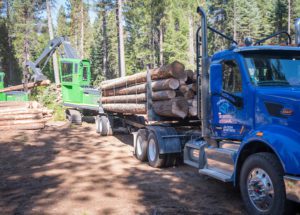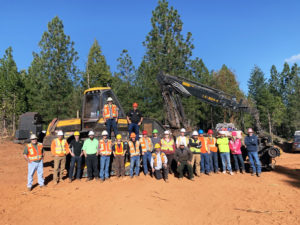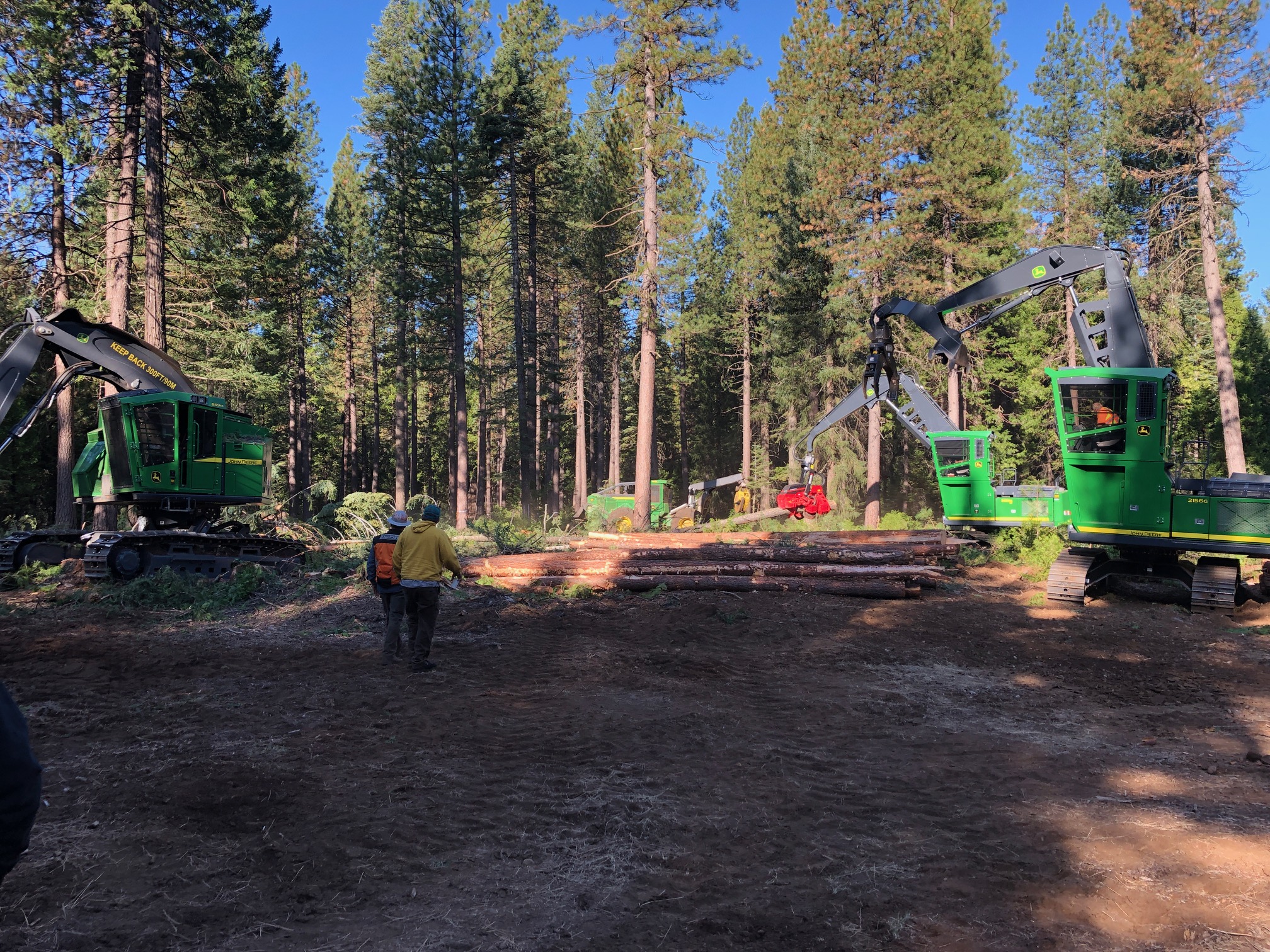Shasta College Heavy Equipment Grads Harvesting Higher Salaries
Shasta College Heavy Equipment Logging Operations Center – January 2020
 Your “desk” is a half-million dollar John Deere 859M Feller Buncher with Quadco 248 Hotsaw. Your professor is rocking a hard hat, and very likely, a beard. In case it wasn’t obvious, you’re not in Accounting class.
Your “desk” is a half-million dollar John Deere 859M Feller Buncher with Quadco 248 Hotsaw. Your professor is rocking a hard hat, and very likely, a beard. In case it wasn’t obvious, you’re not in Accounting class.
In Shasta College’s Heavy Equipment Logging Operations (HELO) program, the “classroom” is 45,000 acres of ponderosa pines, and manning a 35-ton motorized saw just means it’s Monday. It may not be the first image you conjure when you think of career education, but in Shasta County, Heavy Equipment is literally changing the CTE landscape.
“We are surrounded by forests, so our outdoor classroom, where students are training on state-of-the-art equipment, is unparalleled,” says Becky Roe, Senior Project Coordinator for Shasta College’s Economic and Workforce Development division. “These students are getting practical, real-world experience on an active logging site.”
The Feller Buncher, used to harvest and stack trees, is one of four brand new pieces of logging equipment providing a centerpiece for the well-equipped department. Students taking the AGNR 56 Heavy Logging course also have access to Waratah HTH623C Processor, John Deere 2656G Log Loader and a John Deere 648 L-II Skidder. Unsurprisingly, the program tends to attract “hands-on” types.
“I knew I wanted to run heavy equipment,” says program alum Sabrina Cantu, currently succeeding as a Forwarder Operator for Oregon-based Miller Timber Services. “The ability to be able to jump on any piece of equipment… it really helped me to not be freaked when I went into the field.”
For a career professional gravitating toward logging and logistics, it’s hard to imagine a better place to be than Shasta College. With its close proximity to forested Northern California communities and stout commitment to fostering workforce partnerships, the HELO program provides one-of-a-kind opportunities in this evergreen field.
According to Roe, it starts with experienced faculty, recruited largely from regional industry, and continues with genuine opportunities for hands-on field work. With access to live projects like the Nelson Creek Restoration Project and the Forest Management Task Force’s priority work on Highway 44, HELO students are boosting forest communities, even as they build career skills.
 “The work that the students are accomplishing, even at a training pace, is already directly improving the health of our forest communities by creating fuels reduction buffers around populated areas,” says Roe. “[Our] location, industry engagement and our region’s economic ties to this sector create an environment whereby Shasta College can be the perfectly-positioned hub for workforce training.”
“The work that the students are accomplishing, even at a training pace, is already directly improving the health of our forest communities by creating fuels reduction buffers around populated areas,” says Roe. “[Our] location, industry engagement and our region’s economic ties to this sector create an environment whereby Shasta College can be the perfectly-positioned hub for workforce training.”
Such partnerships afford unprecedented access to career pathways in a regional industry that continues to pay high wages. Logging Equipment Operators in California earn an average of $50,110, according to the Bureau of Labor Statistics, with Loggers, Fallers and Logisticians also commanding more than $50,000 annually. With demand holding steady, and industry partners recruiting from within the program, HELO program students graduate to a world of opportunity.
“Shasta College walks side-by-side with industry,” says Roe. “Industry members sit on program advisory councils, engage directly with students to share career opportunities, industry culture, and best practices.”
Shasta College’s two-semester HELO certificate provides a versatile basis in career skills, as well as a foundation for higher degrees in Natural Science and Forestry. The program’s collaborative and cross-disciplinary style prepares grads not only for careers in logging equipment operations, but in diverse specializations like forest fuels reduction, grading and sorting, and even transportation , with new log trucking curriculum set to be fully integrated within the next two years.
“Once you have material on the forest floor, be it logs, biomass, chips or other wood fiber, you need to be able to transport it,” says Roe, referencing the impending shortage of 1.1 million truck drivers projected by the American Trucking Association. “We agreed with our industry partners that the logistics piece needed to be addressed, as well.”
 The program’s commitment to workforce connectivity is exemplified in FIRST SEAT, a summer internship program linking HELO students with regional employers like Sierra Pacific Industries and Peterson Timber, as well as industry groups like Loggers Association of Northern California (LANC) and Associated California Loggers (ACL). Meanwhile, program administrators are exploring new partnerships for training-to-employment internship programs.
The program’s commitment to workforce connectivity is exemplified in FIRST SEAT, a summer internship program linking HELO students with regional employers like Sierra Pacific Industries and Peterson Timber, as well as industry groups like Loggers Association of Northern California (LANC) and Associated California Loggers (ACL). Meanwhile, program administrators are exploring new partnerships for training-to-employment internship programs.
“Industry has expressed their desire to continue industry-funded summer internships, and we are having conversations now about the upcoming summer,” says Roe.
For Cantu, who hails from a logging family, the program’s versatility meant being prepared for everything she’d later encounter on the worksite. From procedural knowledge to familiarity with jargon, equipment, and technology, Cantu entered her new career bolstered by a hard-earned confidence.
“It’s kind of in my blood, so I had an idea of what I was doing,” says the proud granddaughter and grand-niece of career timberfallers. “[HELO] prepared me — I was wasn’t nervous to be on any equipment, because I’d been on so many pieces of equipment before.”
Professionals like Cantu represent a new frontier in a traditionally male-dominated logging industry. And with workforce demand surging right alongside technological advancements, Shasta College’s HELO program is taking an axe to outdated stereotypes in logging.
“We are seeing success across gender, across age and across diverse socio-economic demographics,” says Roe.
And while Cantu remains the only female employee in her department, she envisions accessible pathways like Shasta College’s HELO program as potential game-changers. Once her knowledge and skills went on display, she says, the initial skepticism from male co-workers shredded faster than a sapling in an RX72 Rotary Cutter.
“I’m doing stuff grown men are doing, and doing it just as well as they are,” says Cantu, who is quick to credit Shasta College for her success. “Without this program I wouldn’t have this job I have right now.”